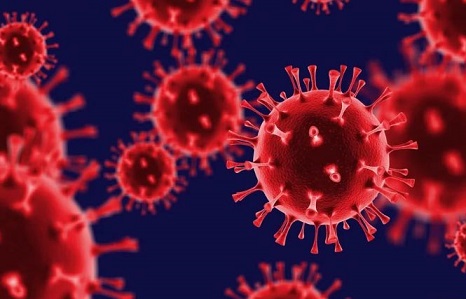Nikhil Prasad Fact checked by:Thailand Medical News Team Sep 15, 2024 1 year, 3 months, 4 days, 18 hours, 21 minutes ago
Medical News: A recent study from the University Hospital Regensburg, Germany, sheds new light on how chemerin, an adipokine involved in various inflammatory and metabolic processes, is influenced by COVID-19. While COVID-19 has been associated with a heightened inflammatory response, the study reveals that underlying diseases like hypertension and liver cirrhosis may have a greater impact on serum chemerin levels than the infection itself. This
Medical News report delves into the key findings of the study, focusing on the connection between comorbidities and chemerin levels in COVID-19 patients.
 Comorbidities drive Chemerin levels in COVID-19, not the virus itself
Background: What Is Chemerin?
Comorbidities drive Chemerin levels in COVID-19, not the virus itself
Background: What Is Chemerin?
Chemerin is an important molecule primarily involved in immune system regulation and fat metabolism. Originally identified for its role in attracting immune cells, it has since been linked to a range of health conditions, including obesity, cardiovascular diseases, and cancer. Elevated levels of chemerin have been observed in individuals with hypertension and other metabolic diseases, while lower levels have been reported in patients with liver cirrhosis.
As COVID-19 continues to affect populations worldwide, researchers have been trying to understand the role of chemerin in the infection. However, conflicting findings about its relationship with the severity of COVID-19 have left many questions unanswered.
Study Overview: Analyzing Chemerin Levels in COVID-19 Patients
The researchers at University Hospital Regensburg conducted a comprehensive analysis of chemerin levels in 124 patients with moderate to severe COVID-19. Patients were categorized based on the severity of their symptoms: 64 individuals with moderate COVID-19 and 60 with severe disease. These levels were then compared with a control group of healthy individuals.
Interestingly, the study found that serum chemerin levels were relatively similar between the moderate and severe COVID-19 groups, with both showing slightly higher levels than the healthy controls. However, patients with hypertension displayed significantly elevated chemerin levels, while those with liver cirrhosis had lower levels.
Key Findings: Chemerin and Comorbidities
-Hypertension and Elevated Chemerin Levels
The study revealed that COVID-19 patients with hypertension exhibited notably higher chemerin levels than those without hypertension. This finding suggests that hypertension plays a more significant role in increasing chemerin levels than COVID-19 itself. Even after adjusting for other variables, the difference in chemerin levels between hypertensive and non-hypertensive patients remained significant.
-Liver Cirrhosis and Lower Chemerin Levels
On the other hand, patients with liver cirrhosis had lower serum chemerin levels. This is consistent with previous research indicating that liver dysfunction can reduce chemerin production. In patients without liver cirrhosis or hypertension, chemerin
levels in COVID-19 patients were found to be similar to those in healthy controls.
-No Significant Difference Between Moderate and Severe COVID-19
Contrary to some expectations, the severity of COVID-19 (moderate versus severe) did not appear to have a significant impact on chemerin levels. Both groups exhibited chemerin levels that were marginally higher than healthy individuals, but the difference was not statistically significant. This finding further supports the notion that underlying conditions, rather than the severity of the infection itself, have a more substantial influence on chemerin levels.
The Role of Chemerin in Inflammation
Chemerin has long been recognized as a molecule involved in inflammation, which is a hallmark of both metabolic diseases and severe COVID-19. The study found positive correlations between serum chemerin levels and inflammatory markers such as C-reactive protein, alkaline phosphatase, and eosinophils. These markers are commonly elevated in individuals with conditions like hypertension and liver cirrhosis, further underscoring the link between underlying diseases and chemerin levels.
Moreover, the researchers explored whether serum chemerin levels could predict COVID-19 outcomes, such as survival. Both survivors and non-survivors had similar chemerin levels, suggesting that chemerin may not be a reliable prognostic marker for COVID-19 severity or mortality.
Urinary Chemerin: No Significant Findings
In addition to analyzing serum chemerin levels, the researchers measured urinary chemerin levels in a smaller cohort of COVID-19 patients and controls. Urinary chemerin levels were similar between COVID-19 patients and healthy controls, with no significant differences observed between patients with moderate or severe disease. This indicates that urinary chemerin may not be a useful biomarker for assessing the severity of COVID-19 or the presence of underlying diseases like hypertension or liver cirrhosis.
Study Limitations
While the findings of this study provide valuable insights into the role of chemerin in COVID-19, there are several limitations to consider. For instance, the study did not document the vaccination status or medication use of the patients, which could have influenced the results. Additionally, the researchers did not analyze body mass index (BMI) or other metabolic factors in the control group, which could have provided further context for the findings.
Moreover, the study relied on spot urine samples, rather than 24-hour urine collections, which may have affected the accuracy of the urinary chemerin measurements. Despite these limitations, the study offers a compelling argument that underlying diseases like hypertension and liver cirrhosis are more significant drivers of chemerin levels than COVID-19 itself.
Conclusion
In conclusion, this study findings highlight the importance of considering underlying health conditions when analyzing chemerin levels in COVID-19 patients. While serum chemerin levels were slightly elevated in COVID-19 patients compared to healthy controls, these increases were largely driven by comorbidities such as hypertension and liver cirrhosis. This article emphasizes that the virus itself may have a lesser impact on chemerin levels than previously thought. Moreover, the findings suggest that chemerin is not a reliable biomarker for predicting COVID-19 severity or outcomes.
The study findings were published in the peer-reviewed journal: Biomedicines.
https://www.mdpi.com/2227-9059/12/9/2099
For the latest COVID-19 News, keep on logging to Thailand
Medical News.
Read Also:
https://www.thailandmedical.news/news/covid-19-shortens-leukocyte-telomere-length-but-this-is-not-associated-with-cognitive-impairment-issues
https://www.thailandmedical.news/news/study-warns-that-coinfections-with-dengue-trigger-the-emergence-of-new-sars-cov-2-variants
